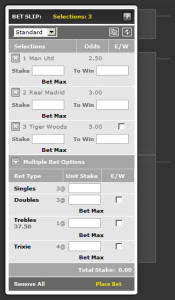UK Betting Terms Explained
If there’s one thing that sports betting is full of, it’s jargon. In this article I hope to shed some light on the baffling array of terms that are used in the bookies and by the time you get to the bottom of the page you’ll know your Lucky 15s from your Yankees.
Each Way Betting

The first thing we need to do is look at bets on big field events. Usually in horse races and golf tournaments etc you can either bet on a ‘win’ where you just pick who you think is going to win the event, or you can bet ‘each-way’ which is a little bit more complicated and best explained with an example:
Lets say you make an each-way bet on a golf tournament on a player who starts off at 8/1. You’ll often see at the bottom of the bet slip that each-way pays 6 places at 1/4 the odds. When you make say a $20 bet, in effect half of your stake is being made on the player to win the event and half is being made on them placing in the top 6, but this bet is at 1/4 the odds, or 2/1.
So what happens if your player wins? Well, you’ve got $10 on him at 8/1 so you win $80 and get your $10 back for a total of $90, but he also wins the ‘place’ bet, where you had $10 at 2/1, so your return for this part of the bet is $30, and your grand total is $120 back.
What about if he doesn’t win? Say he finishes 3rd, then the ‘win’ part of your bet is obviously a loser, so that $10 is gone, but you win on the ‘place’ bet where you had $10 at 2/1, for a total of $30 back; a $10 profit. Generally if your selection places when you have an each way bet on, you’ll make a small profit.
Multiple Bets
Multiple bets are really popular nowadays. A lot of people like to do an ‘accumulator‘ on a day’s football matches which gives them a chance to win huge if all of their selections come in. Here’s an example: Lets say you pick out four selections for your ‘acca’ as they’re annoyingly becoming known at the following odds 1/2, 5/6, 5/4 and 2/1 and you put $10 on it. What your effectively doing is rolling over your bet from one event to the next.
If your first selection wins (at 1/2) you $10 has become $15, and you’re placing that on the next bet at 5/6. If it wins then you’d have $27.50 on the next one at 5/4 and $61.88 on the last one at 2/1 and if it wins then you take home $185.64. The total odds of all 4 of these events happening is about 18.5/1. Most bookmakers will take up to 6 selections on a single accumulator and sometimes the odds can run in the thousands-to-one!
You might think it would be pretty sickening to have 5 of your 6 selections come in and you leave empty handed. If that’s the case then there’s a different type of bet for you. Beware that these ones get a bit complicated but they’re all pretty much the same thing. Let’s take the example again where you make 4 selections, but as well as just an accumulator, you want to win some money if two, or three of them come in: This is called a ‘Yankee‘. Imagine your selections are A,B,C, & D. When you place a Yankee your places 6 ‘doubles’ on AB, AC, AD, BC, BD, and CD as well as 4 trebles on ABC, ABD, ACD, and BCD, and your accumulator for a total of 11 bets. So if you wanted to do a $2 Yankee it would cost you $22.
Similarly a bet like this with 5 selections is called a Super-Yankee or Canadian. Here you have 10 doubles, 10 trebles, 5 fourfold accumulator and a 5 fold accumulator. for a total of 30 bets!
A bet with 6 selections is called a Heinz and it, like the sauce company has 57 varieties of doubles, trebles, four timers, five timers, and a 6 timer.
A bet with 7 selections is called a Super Heinz and has 120 different bets, while an 8 selection bet is called a Goliath and it has 247 different bets in it. If all 8 selections win, you can probably retire!
You might have noticed that none of these bets include singles, which means that you won’t win anything if you only pick one winner. There are bets you can make which include singles and they have slightly easier to understand names. A Lucky 15 is a 4 selection bet with singles included, while a Lucky 31 is a 5 selection bet, the equivalent of the Canadian. Lastly, a Lucky 63 is the equivalent of the Heinz. Beyond that, they don’t really have names so you can call them what you want!

